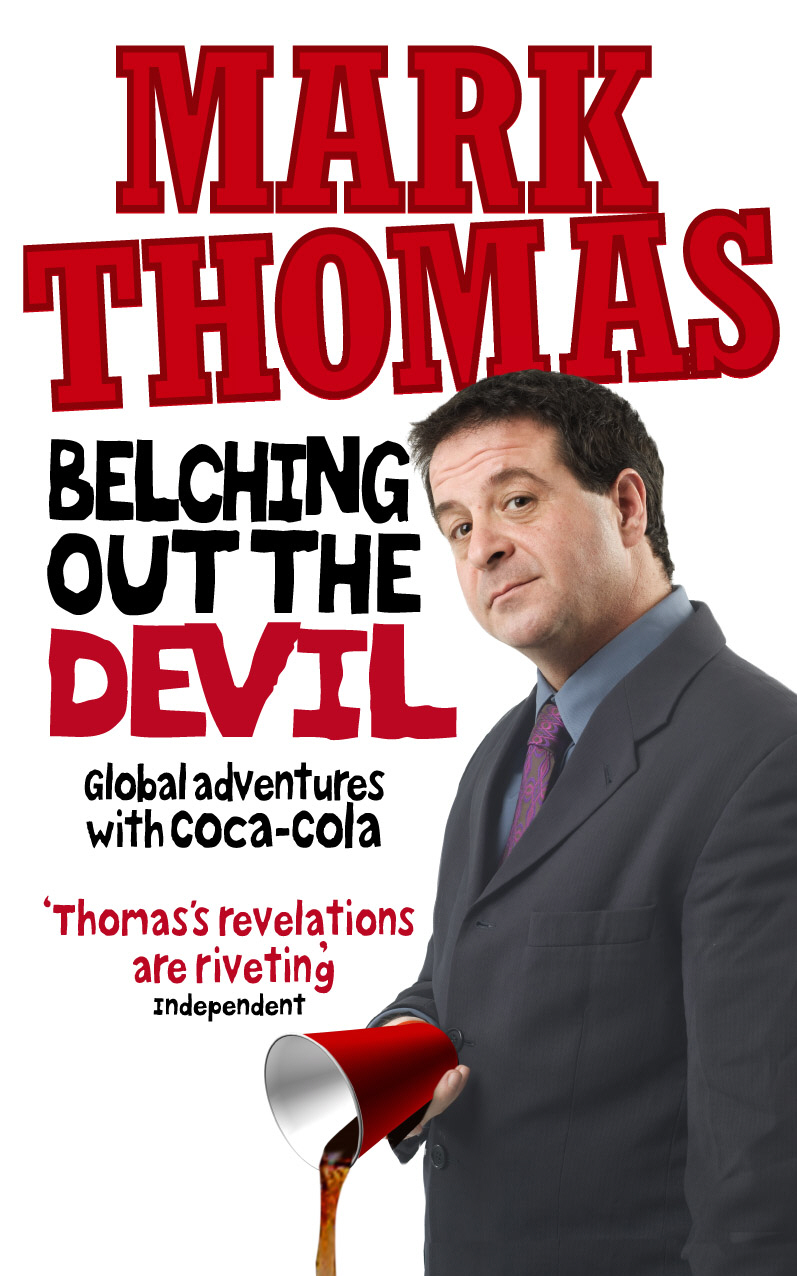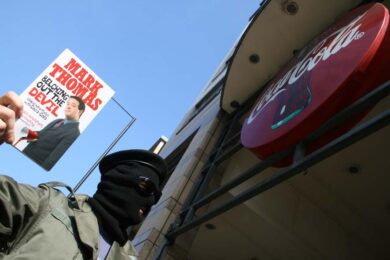Change that you can be certain we won’t see under President Obama is the American government’s continued encouragement of US corporate imperialism and hegemony. In fact it appears the President-Elect has already surrounded himself with the same Democrat Party faithful as Bill Clinton – who was responsible for the WTO as well as NAFTA.
But it’ll make zero difference to Mark Thomas’s tireless campaigning. Stand-up comic turned agent provocateur and writer, in his latest book Belching Out The Devil, Thomas travels the world to expose the flaws of the Coca-Cola business system: a bottling plant in Colombia where trade unionists are routinely murdered by paramilitary death squads, child labour in fields surrounding a sugar mill in El Salvador and the unfathomable decision of opening a plant heavily reliant on water in an area of India already prone to drought.
The Coca-Cola Company absolves itself of any blame because on paper it doesn’t actually own any of these franchise plants or the independently owned sugar mill. All it does is manufacture the syrup ingredient to make the fizzy pop. "All of this stuff is about Coke’s tentacles and the way it works," says Thomas. "It draws these lines of demarcation between responsibility."
Belching Out The Devil is the result of four years research. Part poignant travelogue, part revelatory info bomb studded with humorous observation and satire, it’s a follow-up to Thomas’s 2006 exposé of the international arms trade, As Used On The Famous Nelson Mandela.
So why Coke? Unlike arms dealers, as Thomas points out, Coke is everywhere and impacts directly on millions of people’s lives on a daily basis in the form of products, merchandise, vending machines, and inexorable advertising and sponsorship. Such brand ubiquity suggests Belching Out The Devil has a bigger picture behind it. So is it a book about Coca-Cola or globalisation?
"It’s both," says Mark without hesitation. "It’s absolutely both. Because Coke are the brand leaders – they’re the outriders – for globalisation. It’s a case study of globalisation. It questions what we see every day. It’s looking behind that."
Along with Iraq war demonstrations, resistance to globalisation – especially during G8 summits – has become the highest-profile protest of the 00s. But can protest against an enormously popular soft drink manufacturer’s business practice gain similar widespread support? And is it likely?
Thomas: "Coke spend $2.5 billion on advertising for goodwill: brand recognition, brand choice. And they have to keep putting that in to make us feel good about them. So replacing the good images with bad images is a step in the right direction. I think there is room for trade unions, room for student boycotts. There’s room for everyone to be involved with something."
For Thomas, student protest is something close to his heart. After drawing inspiration from the music of the late 70s, he first became politically active during one of the most bitter and longest-running UK disputes of the late 20th Century.
"Punk rock had a huge impact on my life," affirms Thomas, who once roped in Chaos UK for a McDonald’s drive-thru protest (they played on the back of a flat-bed truck) for his Channel 4 TV show in the 90s. "If you love music, it captivates you; it’s all-consuming. Bands like Crass or The Clash, or people like Linton Kwesi Johnson – who’s just a genius. His albums drip with ideas – it’s always about the ideas."
The catalyst for Thomas’s campaigning nature was his involvement with the miners’ strike whilst at Wakefield college in the early 80s. He organised benefits and fundraisers that honed his own stand-up and writing: "We used to write a show in a day. Then perform it the next evening! They were sketch shows with songs – it was just taking the piss. We’d charge two quid. We’d even do ’em in soup kitchens! Activism and art inspires me – more than any ideology – real people doing real stuff. Grassroots activism is the only stuff of any worth."
It’s grassroots activism that makes Belching Out The Devil such an inspirational and stimulating read: peasants and farmers just trying to make ends meets faced with the added obstacle of a business on their doorstep sucking up the already meagre resources. But they’re refusing to put up with it. Thomas meets a group of Indian farmers who organise against their local plant and Turkish workers peacefully occupying a plant before being attacked by riot police.
But does such protest work? Can what may appear desultory demonstrations either at the eye of the storm – or here in the relative comfort of the west – make a transnational company improve their business practices?
"Coke have been forced to react," says Thomas. "Since all this trouble started, they have lost money. I find myself privileged because I get to see all these people," he says about the workers and farmers he met and interviewed. "They’re outstandingly brave. It’s absolutely amazing. I think it’s human instinct to organise and protest and fight when you’re being oppressed. These people are bottom of the pile but they’re fighting back."

Belching Out The Devil – Global Adventures With Coca-Cola by Mark Thomas is out now, published by Ebury Press.



